Warehouse Storage vs. P2P Storage: What’s Best for Businesses in India?

With India’s booming economy and increasing e-commerce activities, businesses require efficient storage solutions to manage inventory, raw materials, or office equipment. Traditionally, companies relied on warehouse storage, but with technological advancements, Peer-to-Peer (P2P) storage has emerged as a viable alternative. This article explores the key differences between warehouse storage and P2P storage, highlighting their benefits and limitations to help businesses choose the best option.
Understanding Warehouse Storage
Warehouse storage refers to renting or leasing space in large industrial facilities designed for storage purposes. These warehouses may be managed by third-party logistics providers, private companies, or government entities.
Benefits of Warehouse Storage:
- Large-Scale Storage: Warehouses offer vast spaces suitable for bulk storage needs.
- Security and Infrastructure: Most warehouses have surveillance systems, security personnel, and climate-controlled environments.
- Supply Chain Integration: Warehouses are often strategically located near transport hubs, reducing logistics costs.
- Customization: Businesses can choose from cold storage, bonded warehouses, or specialized storage solutions.
Limitations of Warehouse Storage:
- High Costs: Renting a warehouse can be expensive due to lease agreements, maintenance, and utility expenses.
- Rigid Contracts: Long-term commitments can be a financial burden, especially for small businesses.
- Limited Accessibility: Warehouses are usually located outside city centers, making access inconvenient.
- Underutilized Space: Businesses may end up paying for more space than required.
Understanding P2P Storage
Peer-to-Peer (P2P) storage is an innovative model where individuals or businesses rent unused storage space from other individuals or companies via an online platform like PeerVault. This decentralized approach offers more flexibility and cost efficiency.
Benefits of P2P Storage:
- Cost-Effective: P2P storage eliminates overhead costs associated with traditional warehousing.
- Flexible Contracts: Users can rent space on a short-term or long-term basis without rigid commitments.
- Proximity Advantage: Businesses can store goods closer to their operational areas, reducing transportation costs.
- Scalability: Easily increase or decrease storage space based on demand fluctuations.
- Sustainability: Utilizing unused spaces contributes to a circular economy, reducing the need for new infrastructure.
Limitations of P2P Storage:
- Security Concerns: Unlike warehouses, not all P2P storage spaces may have high-end security measures.
- Insurance and Liability: Coverage policies may vary, requiring businesses to verify insurance options.
- Varied Storage Conditions: Some spaces may not be climate-controlled or suitable for sensitive goods.
Warehouse Storage vs. P2P Storage: A Comparative Analysis
Feature
Warehouse Storage
P2P Storage
Cost
High rental and maintenance costs
Affordable, pay-as-you-use model
Flexibility
Long-term contracts
Short-term and flexible contracts
Accessibility
Often located on city outskirts
Available within urban and suburban areas
Security
Highly secure with surveillance and guards
Security varies depending on the provider
Scalability
Limited by warehouse availability
Easily scalable as per business needs
Sustainability
Requires new infrastructure
Utilizes existing spaces
Feature | Warehouse Storage | P2P Storage |
Cost | High rental and maintenance costs | Affordable, pay-as-you-use model |
Flexibility | Long-term contracts | Short-term and flexible contracts |
Accessibility | Often located on city outskirts | Available within urban and suburban areas |
Security | Highly secure with surveillance and guards | Security varies depending on the provider |
Scalability | Limited by warehouse availability | Easily scalable as per business needs |
Sustainability | Requires new infrastructure | Utilizes existing spaces |
When is Warehouse Storage the Best Option?
Warehouse storage may be ideal for large businesses or companies in industries where storage security, inventory control, and bulk handling are paramount. Here’s when warehouse storage is your best bet:
- Large-Scale Operations: For businesses dealing with high-volume goods.
- Strict Regulatory Compliance: For companies needing to meet specific regulatory or safety standards.
- Long-Term Storage: When long-term storage contracts provide predictability and scalability.
When is P2P Storage the Best Option?
P2P storage is a game-changer for small and medium-sized enterprises (SMEs) or startups that need cost-effective and flexible solutions. Here’s when P2P storage is the right choice:
- Small and Medium-Sized Enterprises (SMEs): Those needing smaller, more affordable spaces.
- Temporary Storage: Businesses requiring short-term storage without long-term commitments.
- E-Commerce and Logistics: Companies looking to optimize their storage locations for faster deliveries and reduced transportation costs.
Key Factors to Consider When Choosing Storage for Your Business
Before deciding between warehouse storage and P2P storage, businesses should consider the following factors:
- Storage Size and Volume: Determine how much space you need.
- Duration of Storage: Consider whether you need temporary or long-term storage.
- Security Needs: Evaluate how much security your inventory or goods require.
- Budget: Assess your financial flexibility and what you’re willing to spend on storage.
- Location: Choose a storage facility close to your operational hub to save on logistics costs.
What the Future Holds for Warehouse and P2P Storage in India?
As technology continues to advance and India’s economy grows, the storage sector is expected to evolve. Both warehouse storage and P2P storage are likely to play significant roles in the future of Indian businesses, with P2P storage gaining more traction due to its flexibility, cost-efficiency, and scalability.
Technological Innovations in Storage Solutions
- Automation and Robotics: The rise of automated warehouses will make traditional storage more efficient.
- AI and Data Analytics: These tools will help businesses make smarter decisions on storage needs and space optimization.
- IoT-Enabled Monitoring: Businesses will be able to track inventory and monitor storage conditions in real-time.
Conclusion
As businesses in India continue to grow, storage solutions must adapt to their changing needs. While traditional warehouse storage remains a reliable option, P2P storage offers flexibility, affordability, and scalability. Platforms like PeerVault enable businesses to leverage available storage spaces efficiently, making P2P storage a game-changer in India’s storage industry. The key is to evaluate specific business requirements and choose a storage model that aligns with operational goals and budget constraints.
Popular Posts






